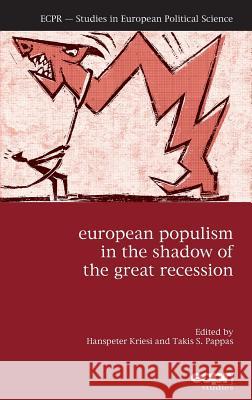European Populism in the Shadow of the Great Recession » książka
European Populism in the Shadow of the Great Recession
ISBN-13: 9781785521249 / Angielski / Twarda / 2015 / 394 str.
European Populism in the Shadow of the Great Recession
ISBN-13: 9781785521249 / Angielski / Twarda / 2015 / 394 str.
(netto: 476,81 VAT: 5%)
Najniższa cena z 30 dni: 493,83
ok. 16-18 dni roboczych.
Darmowa dostawa!
This volume, covering twenty-five populist parties in seventeen European states, presents the first comparative study of the impact of the Great Recession on populism. Based on a common analytical framework, chapters offer a highly differentiated view of how the interplay between economic and political crises helped produce patterns of populist development across Europe. Populism grew strongly in Southern and Central-Eastern Europe, particularly where an economic crisis developed in tandem with a political one. Nordic populism went also on the rise, but this region's populist parties have been surprisingly responsible. In Western Europe, populism actually contracted during the crisis - with the exception of France. As for the two Anglo-Celtic countries, while the UK has experienced the rise of a strong anti-European populist force, Ireland stands out as a rare case in which no such a party has risen in spite of the severity of its economic and political crises.
Covering twenty-five populist parties in seventeen European states, this volume presents the first comparative study of the impact of the Great Recession on populism. Based on a common analytical framework, chapters offer a highly differentiated view of how the interplay between economic and political crises helped produce the various patterns of populist development across Europe. Populism grew strongly in Southern and Central-Eastern Europe, particularly where an economic crisis developed in tandem with a political one. Nordic populism also went on the rise, but this region's populist parties have been surprisingly responsible. In Western Europe, populism actually contracted during the crisis - with the exception of France. As for the Anglo-Celtic world, while the UK has experienced the rise of a strong, anti-European populist force, Ireland stands out as a rare case in which no such party has risen, in spite of the severity of Ireland's economic and political crises.This book makes a distinctive and novel contribution to the vast and still-growing field on populism by analysing the effects of the financial and economic crisis in Europe. In doing so, the authors also rediscover and give new scope to the concept of 'crisis'. Kriesi and Pappas have assembled an impressive group of authoritative country and regional experts, and have successfully combined their detailed knowledge with a coherent overarching framework for analysis. The result is a convincing, informative and - practically and theoretically - relevant comparative analysis of the different parts of Europe.Daniele Caramani, University of ZurichAfter years of grand statements about the rise of populism in the wake of the economic crisis, it was high time for a comprehensive academic study on the topic. Kriesi & Pappas' book dispels many popular myths and should be essential reading for academics, journalists, and politicians alike.Cas Mudde, University of Georgia











